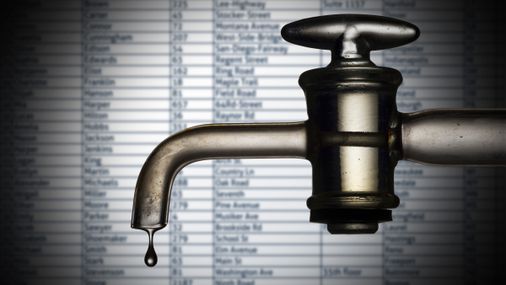Over the past few months, efforts have been underway to implement President Biden’s plan to strengthen America’s electrical grids, expand access to drinking water, and deliver broadband Internet to communities in need.
But the pledge to bring the Internet and water to 24 million households across the country may inadvertently put millions of Americans’ personal information in the hands of US Immigration and Customs Enforcement.
For years, ICE agents looking for information on potential targets have sidestepped regulations by buying massive databases of Americans’ personal records, including customer files from water, gas, electricity, Internet, and other utility providers. As part of our two-year investigation of ICE surveillance, the Center on Privacy & Technology at Georgetown Law found that Equifax, one of the nation’s largest credit bureaus, had taken utility customer files sent in for credit evaluation purposes and sold them to the data giant Thomson Reuters, which fed them into “person-search” databases used by ICE. Through this route, as many as 171 million customers from major utility providers across the country may have had their names and addresses shared with ICE agents, who need no warrant to search these records.
In response to pressure from activists and Congress, utility companies have instructed Equifax to stop selling customer records. But downstream buyers like Thomson Reuters have not taken down the millions of records still in their databases, and have instead “explored every avenue to continue to provide access to this data.” And although ICE’s contract with Thomson Reuters expired last year, the agency has entered a seemingly identical agreement with another company, LexisNexis, which sells databases containing 210 million utility records from unspecified sources.
If lawmakers are serious about expanding Americans’ access to utilities like heat, water, electricity, and the Internet — services that are essential to life and livelihood — then they must protect the personal information that utility companies collect from consumers.
There is a reason why agencies like ICE shell out millions of dollars for access to utility data: 90 percent of American adults have at least one utility bill, and even people who leave minimal other paper trails — such as credit histories or driver’s license records — are still likely to keep the lights on and the water running at home. Companies peddling utility datasets boast that “just about every American adult has [utility] data,” and that these records can reveal information that investigators “might not be able to reach any other way.” Utility accounts also tend to follow you closely. More likely than not, turning on the power and connecting the Internet are among the very first things a person does when moving into a new home.
Despite how much sensitive information can be exposed through utility records, however, few laws exist to limit the sale of data that consumers share with utility providers. Regulations are weak on the federal level, and safeguards for utility data are weak or absent in nearly every state.
This lack of protection could erode people’s willingness to sign up for critically needed services. When a monthly gas or Internet bill can make someone visible to ICE agents — as well as private investigators, police officers, debt collectors, and even bounty hunters hired to locate people who have missed court dates — some households may decide that registering for services is simply too much of a risk. Families worried about their addresses winding up in the wrong hands may enter unsafe arrangements to obtain service, or even make the unthinkable choice to go without utilities altogether.
Any chilling effects on a household’s ability to get utilities can create immediate risks to health and safety, but they also have the potential to ripple outward, leading to long-term destabilizing effects throughout a family’s life. People who are afraid to sign up for utilities may feel compelled to rely on landlords to provide services, which could severely constrain their options for safe and affordable housing. In the era of remote work and gig employment, households without reliable access to the Internet could end up without the means to maintain their jobs or keep their children in school.
Biden’s pledge to “ensure every American has access” to power and water requires more than just upgrading old infrastructure or building new service lines. As long as weak privacy laws make it possible for agencies like ICE to exploit people’s need for water and electricity and the Internet in order to surveil them and their families, the promise of equitable access will remain unfulfilled. Lawmakers cannot afford to wait for households to start shuttering their accounts before putting meaningful safeguards in place.
Nina Wang is a policy associate at the Center on Privacy & Technology at Georgetown Law.
